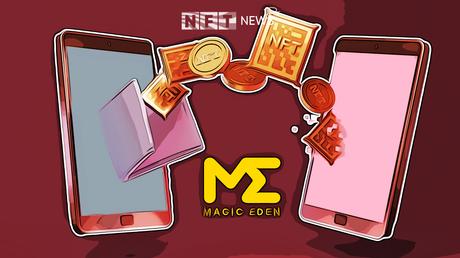
After the launch of MetaShield, a new enforcement tool meant to stop NFT buyers from not paying creator royalties, Magic Eden, a Solana-based marketplace for nonfungible tokens (NFTs), has been able to quiet some community complaints.
Like its launch on September 12, MetaShield, which was reportedly partnered with NFT marketplace and aggregator Coral Cube, got mixed reviews from the NFT community, which was split on whether NFT marketplaces should protect creator rights or lower royalty fees to make NFTs more affordable for collectors.
The NFT royalty enforcement tool was made so that NFT creators could find and hide NFTs that were sold without paying the creator royalties.
In an eight-part Twitter post on Wednesday, Magic Eden defended its new tool by saying that “custom” royalty marketplaces are “punishing” some of the “hardest working creators of today.”
The new tool came out not long after the NFT marketplace X2Y2 introduced a new feature that lets customers choose whether or not to pay a royalty fee when buying an NFT and, if so, how much.
Magic Eden explained the situation in its most recent thread by saying that the goal of MetaShield was to protect creators, not punish users.
According to Magic Eden, most people agree that the ecosystem shouldn’t adopt zero royalty marketplaces for all creators:
“What we do is an experiment, collaborate, and ship. MetaShield might not be perfect, but it provides an option to creators in this debate.”
The NFT marketplace also said that it won’t take control of NFTs and that the tool for collecting royalties won’t be used to punish buyers.
Magic Eden says that MetaShield was made so that creators can “track Solana NFTs listed with custom royalties” and “act as they see fit” to protect their brand.
The Magic Eden website says that NFT creators are given “Editor” rights to protect the NFT. This lets them change the royalty, add a watermark, or make the image hard to see. Once the debt is paid off, the Editor may put the NFT back to how it was before.
community response
When Magic Eden’s MetaShield first came out, the community wasn’t sure how to react.
One Twitter user said that the addition of MetaShield made Magic Eden’s market even more centralized, while another said that no one will mint NFTs if the creators use MetaShield.
Another Twitter user said that they were worried that innocent buyers would be hurt because their recently bought NFT was shielded.
“My biggest worry is that this will hurt the buyer, who might not even know that they bought something wrong. After a certain amount of time, the NFT will all of a sudden become “shielded.” Because of this, they will have to spend a lot more money in the end.
People have also said that Magic Eden’s “protection” of NFT creators is a good thing.
Magic Eden hasn’t been supported by every NFT market. Sudoswap has worked to make its NFT platform easier for buyers to use “chose not to use the royalty fee model and only charged standard platform fees instead.
Langston Thomas from “NFT Now” said that even when smart contracts are set up to pay creators royalties, it is ultimately up to the NFT marketplace to keep the royalty agreement.
This is because the NFT marketplace, which gets the royalty through the transaction, is free to keep it.
Leave this field empty if you're human: